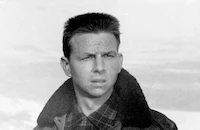For Love or Money

Brief Synopsis
Cast & Crew
Michael Gordon
Kirk Douglas
Mitzi Gaynor
Gig Young
Thelma Ritter
Leslie Parrish
Film Details
Technical Specs

Synopsis
Chloe Brasher, a wealthy widow, hires her attorney, Deke Gentry, to act as matchmaker for her three beautiful daughters, Kate, Jan, and Bonnie. Chloe has chosen three men she considers suitable sons-in-law, and it is Deke's task to pair up the six persons. With only a minimum of effort, Deke is able to interest Bonnie, a health addict, in Harvey Wofford, an income-tax investigator. Similarly, it is not long before he has Jan, a bohemian, in the arms of Sam Travis, a prisoner-rehabilitation expert. Kate, head of a motivational research laboratory, is more difficult; for each time Deke arranges a meeting between her and Sonny Smith, playboy food magnate, Deke himself ends up spending the evening with Kate. As a result, the two fall in love; but when Kate learns of Deke's arrangement with her mother, she walks out on him. Deke persuades her to marry him, however, by offering to give up his fee. As the three couples march to the altar, Chloe reveals that she had Deke in mind for Kate all the time.

Director
Michael Gordon
Cast

Kirk Douglas

Mitzi Gaynor

Gig Young

Thelma Ritter

Leslie Parrish

Julie Newmar

William Bendix
Dick Sargent

William Windom
Elizabeth Macrae
Willard Sage
Ina Victor

Alvy Moore
Jose Gonzalez Gonzalez

Don Megowan

Billy Halop
Joey Faye
Theodore Marcuse
Frank Mahony
Crew
Imogene Abbott
Robert Arthur
Charles Baqueta
Ed Borschell
Edward Broussard
Malcolm Brown
James Curtis
Frank De Vol
Dolly Derderian
William Dodds
Dorothy Drake
William Egan
Robert Forrest
Fay Frame
Jack Freeman
Jack Geraghty
Larry Germain
Joseph Gershenson
William S. Gilmore Jr.
Alexander Golitzen
Butch Harmon
Carl Johnston
Dina Joseph
Corson Jowett
Joseph Kenny
Ed Keyes
Lew Leary
Ruby Levitt
Rydo Loshak
Jean Louis
Alma Macrorie
Larry Markes
Whitey Mcmahon
Michael Morris
Edward Muhl
William Reisbord
James Rogers
Mike Ross
Peter Saldutti
Lavaughn Speer
Clifford Stine
Waldon O. Watson
David Webb
Bud Westmore
Walter Woodworth

Videos
Movie Clip



Film Details
Technical Specs

Articles
For Love or Money
Written by Larry Markes and Michael Morris, and directed by Michael Gordon, For Love or Money came at the end of The Golden Age of Hollywood, when Thelma Ritter had become one of the outstanding character actresses, in films like All About Eve (1950) and Rear Window (1954). While her roles were normally limited to maids, mothers or unglamorous women, For Love or Money gave her the chance to be clothed, groomed and made up to the hilt. When the film debuted, women in the audience gasped at the luxurious gowns by Jean Louis. The Miami News wrote, "You should see what the hairdresser and fashion designer have done for Miss Ritter. The old gal sparkles with glamor." Mitzi Gaynor had been popular in the 1950s in musical films like South Pacific (1958), but by the 1960s, as Gaynor later said, "The movie musical thing was finished, the contract players were flooding the streets and I was just part of the backwash." Instead of retiring, she went back to the stage, becoming hot on the cabaret circuit and in Las Vegas, where she would tour with her shows for decades. While she has appeared on television, most notably in her own Emmy-winning specials, For Love or Money is Gaynor's last film to date. This was also one of William Bendix's last films. Bendix, who Kirk Douglas called "the perfect professional and a delight to work with," died of a heart attack the following year.
When For Love or Money debuted in New York on August 7, 1963, Judith Crist was one of the few who praised Douglas, writing, "Kirk Douglas proves himself an expert with a fast line and a comic situation," but most critics weren't impressed. Douglas was seen by most as badly miscast in a comedy and the problems of the idle rich no longer garnered the comic interest that they did during the Great Depression. The Pittsburgh Press summed it up as being"[A]ll so pretty, sleek and glittering. Too talky, though. If they'd all just shut up Money might be better. As one beatnik said to another, "Man, you opens your mouth and words come out, but you don't say nothin'."
SOURCES:
Manbeck, John B. and Singer, Robert The Brooklyn Film: Essays in the History of Filmmaking
Parish, James and Pitts, Michael Hollywood Songsters: Singers Who Act and Actors Who Sing: A Biographical Dictionary
The Pittsburgh Press 23 Sep 63
Roof, Judith All About Thelma and Eve: Sidekicks and Third Wheels
Stoneham, Gordon "Gordon Stoneham at the Movies: Kirk Douglas Badly Cast" Ottawa Citizen 17 Oct 63
Thomas Tony The Films of Kirk Douglas
Toor, David "Rich Movie Poor in Comedy" Eugene Register-Guard 20 Dec 63
By Lorraine LoBianco

For Love or Money
Quotes
Trivia
Director Michael Gordon (I) had a superstition which made him put at least one of his favorite paintings by Edgar O. Kiechle into each film he directed. While one was being placed on the wall behind actor 'Douglas, Kirk' , Douglas quipped, "I've worked with a lot of tough directors, but he's the first one who ever insisted on holding something over an actors head".
Notes
Location scenes filmed in the San Francisco area. Working titles: Three On a Match and Three Way Match.

Miscellaneous Notes
Released in United States 1963
Released in United States 1963













